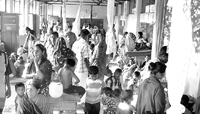|
Mutur displaced facing health risks
Sanitation and waste management in the camps for people displaced after the recent attacks in Mutur are in a poor condition creating health problems, according to an official of the Peace Secretariat for Muslims.
Programme officer of the Peace Secretariat for Muslims Abdul Kalam M. Rayees said the toilets and water supply are not adequate to cater to the huge number of displaced people. He said Muslim women had lost their privacy in these over-populated camps and this is affecting their lives very badly. “Muslims in this area are conservative and have many religious beliefs and customs. So there are many problems in these camps” he said. “If this situation remains for another ten days or more, it will be pathetic. There should be a solution soon” he said. Al Thariq Welfare Centre in Kantale presently shelters 1693 displaced families. “Thirty three families left recently and are permanently settled in Mutur, but many more families are living here amidst many difficulties,” Al Thariq Welfare Centre spokesperson Adil Mujeeb said. He said though there are 110 temporary toilets and three medical units the vast number of refugees are suffering great inconvenience. According to the Muslim Information Centre many refugees are being settled in schools, especially Al Thariq MMV in Kantale which has 6333 refugees. However when the school term starts the children may not be able to attend the school unless alternative arrangements are made for the refugees. When The Sunday Times contacted Healthcare and Nutrition Ministry Secretary Ranjith Maligaspe he said the Ministry is periodically sending a team of medical officers especially epidemiologists to the camps. “We are on the alert as with the limited hygiene facilities available there may be a risk of an epidemic,” he said. He said those in camps, especially children, lack proper nutrition even though they get a meal. Urban Development and Water Supply Minister Dinesh Gunawardena said his Ministry has taken measures to ensure that the displaced get enough water. “We have sent water bowsers to areas where water is needed. We have also sent gully suckers to clean the toilets and ensure the condition of temporary toilets is good. The Ministry is co-ordinating with the District Secretaries and the Water Supply and Drainage Board,” he said. More than 40,000 refugees are placed in temporary camps in Kantale, Mullipotana, Kinniya, Trincomalee, Dambulla, Seruwila, Kurunegala, Kuliyapitiya, Vakarai, Negombo and Wellampitiya. “Already 400-500 families are in Mutur. Some who are living in camps are willing to go back to their homes but most of them are in fear of their lives. We can’t force them to re-settle so it’s our duty to ensure that the Government-controlled areas are safe” said Resettlement Minister Rishad Baduideen. The minister also said free transport was available for those going back to their villages. |
||||
Copyright © 2006 Wijeya Newspapers
Ltd. All rights reserved. |
